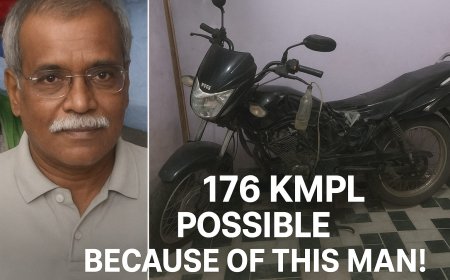Tragedy in Panchkula: What the Death of 7 Family Members Reveals About Mental Health and Financial Stress in India
Seven members of a Dehradun family were found dead in Panchkula, Haryana, in a suspected mass suicide. Learn how this tragedy highlights India's growing mental health and financial stress crisis—and what we can do to help.

On May 27, 2025, a horrifying discovery was made in Haryana’s Panchkula. Seven family members from Dehradun were found dead inside a car in Sector 27. They had reportedly consumed poison in what is suspected to be a mass suicide. Just days earlier, the family had visited a religious event at Bageshwar Dham. Now, they’re gone.
It’s the kind of headline that shocks you—but what’s even more disturbing is the silence that follows. Beyond the headlines, there’s a bigger question: how did it get this bad?
This isn't just a story about one family's heartbreaking end. It’s a mirror held up to our society—reflecting a growing crisis of mental health, financial strain, and emotional isolation in Indian households.
Let’s talk about it.
What Really Happened in Panchkula?
According to initial reports, all seven victims were related—parents and their children. Investigators suspect that they collectively decided to end their lives due to severe financial difficulties. Along the side of the street, the car remained motionless and quiet. There was no sign of violence, only stillness.
The family had recently participated in a spiritual event at Bageshwar Dham, suggesting they may have been looking for hope or divine intervention before making the final decision. While the investigation is still ongoing, early findings point toward suicide by poisoning.

The sheer scale of this loss—an entire family—has stunned the nation.
Financial Pressure Is More Dangerous Than We Think
Managing money is proving to be hard for many individuals at the moment. With inflation on the rise, job insecurity, and the pressure to maintain a certain lifestyle, families often find themselves drowning in debt without a way out.
Every year, many individuals in India end their lives due to financial difficulties. Farmers, small business owners, unemployed youth, and even salaried professionals—no one is immune. In many cases, they suffer quietly, hiding their struggles behind smiles.
The Dehradun family’s story isn’t an isolated case. It’s part of a much larger, much more alarming pattern.
Mental Health: The Elephant in the Room
Despite progress, mental health remains a taboo topic in many Indian homes. You're told to "man up," "think positive," or "pray it away." Seeking therapy is seen as a luxury—or worse, a weakness.
It’s important to realize that mental health matters just as much as physical fitness. If someone is feeling overwhelmed, hopeless, or constantly anxious, they need support—not judgment.
In many cases, emotional distress doesn’t start with a diagnosed disorder. It begins with stress, anxiety, shame, or helplessness—things that often go unnoticed or ignored. Over time, these feelings build up, and if there's no outlet, it can lead to tragic decisions.
What Are the Warning Signs?
People who are struggling often show subtle signs before reaching a breaking point. But if we don’t know what to look for, we might miss them entirely.
Here are some common red flags:
1. Withdrawal from family or social life
2. Sudden mood swings or emotional outbursts
3. Changes in eating or sleeping patterns
4. Expressing feelings of hopelessness
5. Talking about being a burden or not wanting to be around anymore
These signs don’t always mean someone is suicidal, but they are cries for help. Listening can make a bigger difference than you think.
Why This Tragedy Must Be a Wake-Up Call
We often read stories like this, feel sad for a moment, and move on. But that’s not enough. The Panchkula incident should shake us into action.
This is not just a tragedy. It’s a symptom of a larger societal issue—the lack of emotional support systems, the silence around financial difficulties, and the deep-rooted stigma surrounding mental health.
No family should ever feel so cornered, so alone, that death seems like the only way out.
How Can We Help?
You don’t need to be a psychologist to help someone in distress. Sometimes, the simplest gestures can save a life.
1. Start conversations: Ask how people around you are really doing.
2. Be non-judgmental: Don’t offer solutions right away. Just listen.
3. Normalize seeking help: Let’s make therapy as normal as visiting a doctor.
Offer practical support: If someone is facing financial issues, help them find resources or guide them toward aid.
And if you are struggling—please know this: you are not alone, and you are not weak. Reaching out for support is a sign of strength, not something to be ashamed of.
Resources You Should Know About
India has several helplines and organizations dedicated to suicide prevention and mental health support. Share them. Bookmark them. They can save lives.
iCall (TISS Mumbai): +91 9152987821
AASRA: +91-9820466726 (24x7)
Vandrevala Foundation Helpline: 1860 266 2345 / 1800 233 3330
There are also free online counseling portals and government initiatives working to spread awareness. Let’s use them—and encourage others to do the same.
Conclusion: Let’s Not Wait for Another Headline
Seven lives were lost in Panchkula. Seven stories cut short. Behind those numbers were real people—who laughed, cried, struggled, and loved. Their pain must not go unnoticed.
This tragedy is not just about death. It’s about the cracks in our system—the ones we often ignore until it’s too late. Let’s fix those cracks with conversations, support, empathy, and awareness.
Because no one should ever feel like they're facing the world alone.
What's Your Reaction?
 Like
0
Like
0
 Dislike
0
Dislike
0
 Love
0
Love
0
 Funny
0
Funny
0
 Angry
0
Angry
0
 Sad
0
Sad
0
 Wow
0
Wow
0
















































































